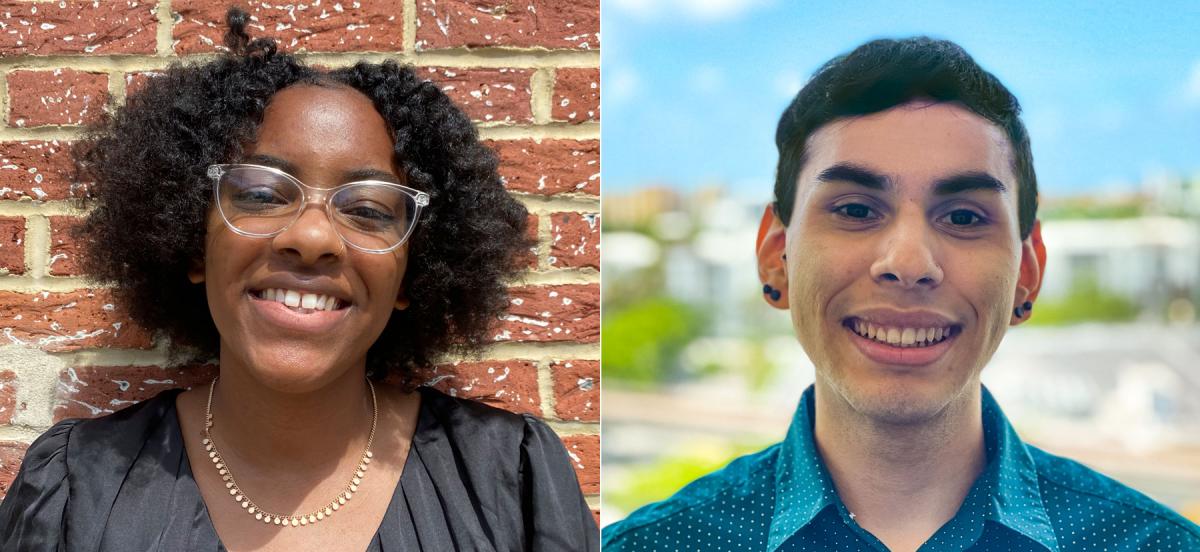Camille Samuels '21 and Daniel Mayo '19 Receive Clementine Cope Fellowships

Camille Samuels' (right) and Daniel Mayo's Clementine Cope Fellowship will help fund their graduate studies next year.
Details
The over-100-year-old Haverford College fellowship for graduate study will support Samuels’ pursuit of a Ph.D. in cultural anthropology at the University of California, Irvine and Mayo’s pursuit of a Master of Science in Global Health at National Taiwan University.
Graduate school can be expensive, but two young alumni are getting some welcome support thanks to a 122-year-old fellowship administered by Haverford. Both Camille Samuels ’21 and Daniel Mayo ’19 are this year’s recipients of the Clementine Cope Fellowship.
“I am filled with relief knowing that I no longer have to worry as much about the financial burden that comes with pursuing a masters degree,” said Mayo, who begins a two-year Master of Science in Global Health program at National Taiwan University in August. “I am glad that I will be able to focus on my studies and enjoy the adventures to come from my time in Taipei.”
“I really feel that this is a huge vote of confidence in my capabilities as a scholar and as someone who can contribute to the field of anthropology,” said Samuels, who is headed to the University of California Irvine to pursue a Ph.D. in cultural anthropology. “I think as someone who struggled to find my place academically, this just shows me that everything that I did paid off in the end and reassures me that my work isn't going unnoticed.”
The Cope was established in 1899 by and named for the granddaughter of a former member of the Haverford College Board of Managers, Thomas P. Cope. Applications from graduating seniors and alumni are accepted each spring. Unlike the College’s other similar fellowship, the Augustus Taber Murray Fellowship, which supports the graduate study of those in a few particular fields (English, classics, German), the Cope assists "worthy and promising graduates of Haverford College in continuing their studies” in any field.
Samuels, who designed her own independent major in health, science, and societies at the College and minored in Africana studies and environmental studies, has long had broad academic interests that didn’t fit neatly into a single department. “I often found myself trying to draw connections between departments that didn’t usually interact with each other,” she said. But in her Ph.D. program, she is looking forward to not only possibly continuing her thesis research on Black-led urban agriculture, but also expanding to explore cultural and medical anthropology, Black geographies, and Black feminist ecologies at UC Irvine.
“Receiving this fellowship will help ensure that I am able to see this program through,” she said. “And I hope that it will help keep me connected to the Haverford community and other Cope fellows as I navigate this pathway.”
Following her Ph.D. program, Samuels expects to continue her research and teaching as a professor, and she hopes to serve as a mentor for underrepresented students who are interested in pursuing graduate school.
“I aspire to match the level and quality of some of the professors that I've had here at Haverford,” she said. “If I can be half of what my mentors have been to me, then I’ll know I will have a successful career.”
For Mayo, a psychology major and health studies minor who has been working in a behavioral medicine clinical research group at the University of Miami since his 2019 graduation, the fellowship means help not only with costs associated with the masters program, but also with those associated with moving to another country.
“Funding for masters programs is next to nothing, and when you apply to programs abroad it is harder to navigate what funding options are available,” he said.
His current research explores how psychosocial and structural challenges converge to worsen HIV-related outcomes among sexual and gender minority (SGM) populations, and he will continue that work in his master’s program with focus on local populations in Taiwan. He eventually hopes to pursue a Ph.D. in epidemiology and work as a social epidemiologist at an international health organization, such as the Joint United Nations Programme on HIV/AIDS.
“Haverford challenged me to move away from a solely biological perspective of health as I learned about an intersectional approach to health disparities,” he said. “Through my liberal arts education, I gained psychological, anthropological, and sociological tools to comprehend the contemporary health problems I observed through an academic lens. With these tools, I broadened my understanding of how interlocking systems of oppression worsen health outcomes for individuals with multiple marginalized identities.”
Read more about Fords who have won fellowships, scholarships, or grants.



